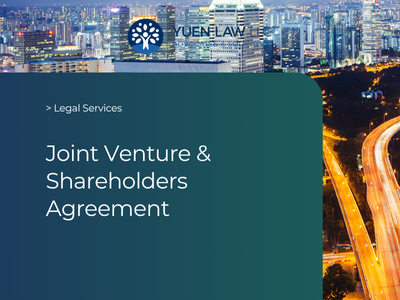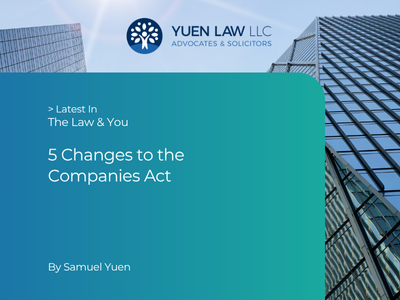According to the latest survey of economies conducted by the International Finance Corporation and the World Bank (based on data received up to June 2012), Singapore is ranked within the top 5 out of 185 economies in various key performance indicators. In many cases, it is also named the top Asian economy for said key performance indicators, including ease of doing business, starting a business, protecting investors, and trading across border.
The superlative performance can be attributed to Singapore’s clear, predictable legal framework, as well as the stable business environment established by the Singapore government over the past decades. In Singapore, a business owner is offered a range of business entities across a spectrum of requirements, such as liability, costs, business models and risk appetites, in which he may undertake his business/commercial endeavours.
Sole Proprietorship
The sole proprietorship is a business owned by either a private individual or a company. Under Singapore law, ‘business’ is defined as any form of trade, commerce, craftsmanship, calling, profession and any activity carried on for the purpose of gain; with the exception of office, employment, occupation or any of the entities, individuals and businesses exempted in the Business Registration Act (Cap 32). The sole proprietorship cannot sue or be sued in the name of the registered business and all legal actions must enjoin the sole proprietor in his own personal capacity.
Profits arising from a sole proprietorship are taxed at the personal level. There are no partners in a sole proprietorship and no separation of legal entity (meaning, the sole proprietor and the sole proprietorship are not considered separate legal persons) between the sole proprietorship of the sole proprietor and his/its other businesses or private holdings. In this regard, the sole proprietor is responsible for any and all liabilities arising in connection to the sole proprietorship. In extreme cases, the sole proprietor may be called upon to make good the losses of the sole proprietorship with his personal assets. As there is no separation of legal entity, a sole proprietorship cannot register another sole-proprietorship or partnership and is only in existence so long as the owner is alive and desires to continue with the business.
A sole proprietorship must be registered with the ACRA, under the Business Registration Act (Cap 32). In order to register a sole proprietorship, the applicant must:
- Be 18 years or older;
- Be a Singaporean Citizen, Singapore Permament Resident, or the holder of a valid Employment Pass or Dependants’ Pass;
- Be resident in Singapore or alternatively, appoint a local manager who is resident in Singapore;
- Where applicable, the self-employed applicant must top up his CPF Medisave account; and
- Not be an undischarged bankrupt, save with the approval of the Official Assignee.
Partnership
Partnerships are proprietorships with two or more proprietors carrying business in common with a view to profit. Like a sole proprietorship, a partnership is not a separate legal entity but nonetheless, can sue or be sued in its own name. The partnership must be registered with the ACRA, under the Business Registration Act (Cap 32). Save for professional partnerships, a partnership with more than 20 partners is prohibited and the partners must incorporate their ‘partnership’ as a company.
Profits arising from a partnership are taxed at the personal level. The partners of a partnership are personally liable for any and all liabilities arising in connection to the partnership, and for each other’s debts and losses. In extreme cases, the partners may be called upon to make good the losses, unpaid debts or obligations of the partnership with their ownerships and personal assets. Moreover, the partners will be jointly liable, meaning that they will all be responsible for the other partners’ misdoings.
As it is not a separate legal entity, the partnership exists for so long as its partners remain alive or for so long as the partnership remains undissolved. A partner in a partnership may also be contractually bound by a partnership agreement.
The application criterion for the registration of a partnership is the same as that of the sole proprietorship.
Limited Partnership
As discussed, limited partnerships are identical to partnerships, save for the ability to limit the liability of a partner contractually. A limited partnership must consist of two types of partners
- The limited partner (defined by the Limited Partnership Act (Cap 163B) as a partner who is contractually not liable for the debts or obligations of the firm beyond the amount of his agreed contribution); and
- The general partner (with day to day control)
Unlike partnerships, limited partnerships can be formed by any number of partners and a corporate entity (such as a company) may be a partner.
Profits arising from a partnership are taxed at the personal level. The general partners and the limited partners are jointly responsible for any and all kinds of liabilities arising in connection to the partnership. The general partner is liable without limitation while the limited partner is liable only up to the agreed contribution.
A limited partnership must have at least 1 limited partner, failing which, the limited partnership registration will be suspended and all partners are deemed to be registered as a partnership. The limited partnership can be terminated only by general partners due to the cessation of business or due to dissolution.
In order to register a limited partnership:
- There must be at least 1 general and 1 limited partner.
- They can both be either 18 years or older or corporate bodies.
- Be a resident in Singapore or alternatively, appoint a local manager who is a resident in Singapore.
- A Foreigner who would like to register an LP in Singapore, is required to appoint a locally resident manager and has to seek approval from MOM before registration.
- Only an individual with SingPass (i.e. through a professional business registration firm) can proceed to submit any online transactions or perform the required endorsements via BizFile (ACRA’s online filing system).
- Top up CPF Medisave account, if fully self employed before registering to the partnership.
- Not be an undischarged bankrupt, save with the approval of the Official Assignee.
To this regard, similar to partnerships, limited partnerships can be easily registered with ACRA according to Limited Partnership Act (Cap 163B). For this reason, they are usually suitable for short-term projects with deadlines, including joining forces between individuals to build apartments for sale, or to carefully start a venture before considering incorporation after certain targets are met.
Limited Liability Partnership (“LLP”)
A LLP and its partners are essentially separate legal entities.
Unlike the sole-proprietorship, the partnership and the limited partnership discussed previously, a LLP can do the following:
- Own property in its own name;
- Sue and be sued in its own name; and
- Limitation of each and every partner’s liability.
Like the limited partnership, there is no cap on the number of partners that may participate in an LLP and profits are taxed at the personal level.
The liability of a partner of a LLP is limited against debts and losses of the LLP incurred by the other partners, unless the debt or loss arose as a result of that partner’s own wrongful actions.
As the LLP is a separate legal entity, it has ‘life’ of its own in the eyes of the law. A LLP enjoys perpetual succession, meaning that its existence is not dependent on the lifespan of its partners. The LLP will thus remain in existence until wound up or struck off. The LLP may also be wound up voluntarily by its members or by Court order.
The LLP is governed under the Limited Liability Partnerships Act (Cap 163A) and its formation is subject to the following criteria:
- At least 2 partners (individuals 18 years or older or a corporate body)
- At least 1 manager residing in Singapore who is 18 years or older
- A foreigner who wishes to set up an LLP has to seek approval from MOM before registration.
- Only an individual with SingPass (i.e. through a professional business registration firm) can proceed to submit any online transactions or perform the required endorsements via BizFile (ACRA’s online filing system).
- Not be an undischarged bankrupt, save with the approval of the Official Assignee.
In this regard, and considering the relative ease of registering a LLP, this setup may be particularly attractive, for instance, to professionals and professional firms who are wary of bearing unlimited liability for a partner’s tort on the partnership’s behalf, such as lawyers and accountants. Businesses focusing on single or limited term projects may also be attracted by this business structure.
Company
Like the LLP, a company is a separate legal entity. It may do the following:
- Own property in its own name;
- Sue and be sued in its own name; and
- Limitation of each and every partner’s liability.
A company can take many forms:
- Company limited by shares;
Private company (between 1 to 50 members)
i. Exempt private (all private individuals)
ii. Non-exempt private (may include corporate entities) - Public company (more than 50 members)
- Company limited by guarantee
A person can assume different roles in a company. Besides members limited by guarantee or shares, a person can also act as an officer, including directors, and actively manage the corporation. Unlike previous business models, profits arising from a company’s business are taxed at the corporate tax level rather than the personal level.
A member of a company cannot be made personally liable for the debts and losses of the company unless in extreme circumstances where the ‘corporate veil’ is removed. Companies enjoy perpetual succession. A company may, however, be wound up or struck off.
A company must be registered with the ACRA, under the Company Act (Cap 50). In order to register a company, it would need:
- At least 1 member.
- At least 1 director residing in Singapore, 18 years or older.
- A director cannot be an undischarged bankrupt, save with the approval from the court or of the Official Assignee.
Finding The Right Fit For Your Business
The choice of business entity most suited to your needs depends on the nature of your business, as well as you and your collaborators’ personal objectives. It is important to first understand your own needs, before deciding on which business entity is best suited to carrying your business to greater heights.
For more information, please feel free to contact us to make an appointment with us.
Yuen Law LLC has been featured on FinestInCity Singapore as one of the best law firms in Singapore.
Special thanks to Mr Marco Notarnicola, JD (NUS) for his invaluable contribution and tireless research.



